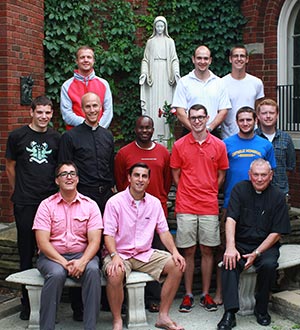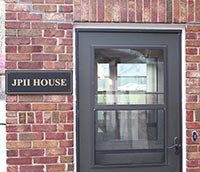For over two years, the John Paul II House of Discernment has been giving young adult men a chance to delve deeper into their faith for months at a time. Fr. Luke Strand, center row, second from left, Fr. Peter Patrick Kimani, associate pastor of St. Robert, center row, third from left, and Fr. Dennis Dirkx, pastor of St. Robert, front row, far left, pose with residents of the John Paul II House of Discernment in this photo taken during the summer program. The house for young men ages 20 to 28, is located on the St. Robert Parish campus, Shorewood. (Submitted photos courtesy John Paul II House of Discernment)
Fr. Luke Strand, center row, second from left, Fr. Peter Patrick Kimani, associate pastor of St. Robert, center row, third from left, and Fr. Dennis Dirkx, pastor of St. Robert, front row, far left, pose with residents of the John Paul II House of Discernment in this photo taken during the summer program. The house for young men ages 20 to 28, is located on the St. Robert Parish campus, Shorewood. (Submitted photos courtesy John Paul II House of Discernment)
“As the culture moves farther and farther away from God, there are very few supportive environments where a man can go and be encouraged in a priestly call,” said Fr. Luke Strand, founder of the facility that has housed more than 25 men since it began. “I definitely found a need for it and I think vocation directors around the country are seeing that need.”
Five men live in the house, along with Fr. Strand and Fr. Peter Patrick Kimani, associate pastor of St. Robert Parish, Shorewood. All are either full-time students or are employed full-time, and completed an application process that included interviews with Fr. Strand and a screening process. Each pays $150 a month for rent – a donation to St. Robert Parish – and $50 each month for food. Fr. Strand said there’s no archdiocesan financial investment, but people have individually donated to help with food and renovations.
The house, which can hold seven men during the school year – during the summer months they can take up to 13 because they also use the parish convent – is located on the St. Robert Parish campus. Its aim is to bring together a community of men contemplating priesthood.
“It’s a huge leap of faith for a man to enter the seminary,” Fr. Strand, vocation director for the archdiocese, said.
|
Only men, ages 20 to 28, are allowed to live in the house for up to one year, but visitors are welcome as long as it’s OK with the roommates. No one under age 18 is allowed in the house.
The idea is to offer young men a place to reflect and discern a possible vocation while offering a glimpse into priestly life.
“The priesthood is such a mystery to so many people and giving young adults the opportunity to participate in the day in, day out life of a priest really gives them a beautiful perspective of what the life is all about,” Fr. Strand said. “It’s not just a house for good Catholic men, it’s that last step before one would enter the seminary to kind of give them the courage and supportive environment to ask the deep question.”
Chris Stancato moved into the house in September as a graduate student in educational psychology at the University of Wisconsin-Milwaukee.
Stancato, along with the other men living in the house, get up around 6:30 every morning for prayer. If they wish, they can wake up an hour earlier and join Fr. Strand for a “holy hour.”
“The best aspect about living there is the prayer life, which is easily accessible,” Stancato said, adding it’s nice that they have a chapel on the top floor of the house so they could go to Mass.
Stancato said when he moved to Milwaukee he was looking for Catholic roommates and Fr. Strand told him about the JPII house.
“I know it’s important to live with people who will foster your faith and will help you grow,” Stancato said. “All the guys that live there are good Catholic guys striving to live a holy life.”
The men are also involved with Cor Jesu, an evening of eucharistic adoration, confession with contemporary music, followed by Mass.
“We usually host a dinner beforehand for guys that Fr. Luke has invited,” Stancato said.
The men are responsible for cleaning the bathrooms, sweeping the floors, washing the windows, among other things.
Although it’s only been a few months, Stancato believes he made the right living choice.
“Words can’t even describe how much I’ve grown spiritually,” he said. “It’s been very impactful in my own discernment process.”
Living in the JPII house had such an impact upon Steven Buting that he entered Saint Francis de Sales Seminary.
“My faith has grown a lot,” Buting said about his experiences at the JPII house.
Buting lived there in the summers of 2012 and 2013. Between those summers, he studied history and religion at the University of Wisconsin-Madison.
Buting said he was always curious about what it would be like to be “married” to the church. After spending time at the house, he knew the seminary was the logical next step.
“I kind of had the beginnings of what it’s like to live in community,” Buting said. “We knew what we were getting into in the future.”
During the summer, Buting said not only would they volunteer for Cor Jesu, but they also helped with seminary camps, retreats, and, for the men in the house, they even planned a canoe trip.
“That was fun because it was an opportunity for all of us to gather in just a very relaxed camping atmosphere,” Buting said.
While living in the house the men play board games. The most popular is Risk, a game where players amass giant armies to take over the world.
“Men in discernment are like every other man,” Buting said. “We kind of have this innate desire for power … innate desire for competition.”
Buting said there would be trash talking and threats to “flip the board,” but it was all in good fun.
“Risk gave us the opportunity to talk as well,” he said. “Topics having to do with the church were pretty abundant. We’d talk about where we thought the church was or what we would do if we were pastors.”
They would also talk about politics, religion in the public light, and the merits of fantasy fiction literature vs. non-fiction.
Buting said if more men knew about the house, more men would take advantage of the opportunity.
“Obviously it’s intentionally focused on discernment,” he said. “But from the guys that lived there for the whole year, rather than just the summer, they really knew at the end of the year-long commitment whether seminary was going to be something they were going to pursue.”
For Buting, the answer was clear.
“The transition was much easier because of the JPII house,” he said. “I’m where I’m supposed to be.”
Ricardo Torres

 For more information
For more information